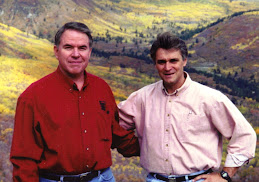We had two great keynote speakers today to close out the event:
Charles Fadel from Cisco - Multi-Modal Learning - Myths and realities of multimodel  learning. One of the myths refuted was the old "we learn 10% of what we learn... to 90% of what we do". These statistics basically are not true. Muliti modal leanring is better then single modal, BUT... mastering basic skill is hurt by high degrees of interactivity at the same time. Students reach congnative overload. Teaching higher-level skills is the complete opposite. (See a picture of the slide - sorry about the tilt!)
learning. One of the myths refuted was the old "we learn 10% of what we learn... to 90% of what we do". These statistics basically are not true. Muliti modal leanring is better then single modal, BUT... mastering basic skill is hurt by high degrees of interactivity at the same time. Students reach congnative overload. Teaching higher-level skills is the complete opposite. (See a picture of the slide - sorry about the tilt!)
 learning. One of the myths refuted was the old "we learn 10% of what we learn... to 90% of what we do". These statistics basically are not true. Muliti modal leanring is better then single modal, BUT... mastering basic skill is hurt by high degrees of interactivity at the same time. Students reach congnative overload. Teaching higher-level skills is the complete opposite. (See a picture of the slide - sorry about the tilt!)
learning. One of the myths refuted was the old "we learn 10% of what we learn... to 90% of what we do". These statistics basically are not true. Muliti modal leanring is better then single modal, BUT... mastering basic skill is hurt by high degrees of interactivity at the same time. Students reach congnative overload. Teaching higher-level skills is the complete opposite. (See a picture of the slide - sorry about the tilt!) The concept of telepresence was also discussed. This is a technology where you don't "see" the room as in teleconferencing. Instead, you see a representation of the individual and can see expressions and reactions better then the "old" video conference technology. The point was that we waste congnative energy trying to see the "room" and reactions in the video conference domain. With the telepresence tool we see these important communication cues more seamlessly. This has tremendous impact on learning and the teleworker/remote worker.
Steven M.R. Covey - Author of "The Speed of Trust" - Trust in Difficult Times - Steven has traveled to 20 countries in the last year since writing his book and has found Trust to be a universal issue. Trust is the currency of today's world and can be learned. Transparency is vital for trust. The foundation of trust is intellectual, but there is an emotional side. We need to learn to hire for BOTH character and competence. Workers trust peers more then their CEO's and managers. Social networks can use techology and ratings to help "see" this trust dimension.
Competences of trust - A combination of crediblity and behavior. Only 13% of organizations at the conference are systematically measuring trust (we used audiance response voting tools throughout the conference to take random surveys like this). 22% measure trust exteranlly with shareholders and customers. Organizations focus more on building trust and brand externally then they do buiding it internally with employees. We need to make an economic case for trust. It will have more staying power.
- Make the creation of trust a defendable objective like other business objectives.
- Start measuring trust.
- Start modeling it from the inside out and top down.
Trust can't be faked over the long term. Motive matters and will manifest itself. This is a long run play. The first job of a leader is to INSPIRE trust. When we give it we can receive it.
That's it for now!! Time to head home, collect our thoughts, AND get some REST!! We hope more of you can attend with us next year... Let us know if you have any questions!!




No comments:
Post a Comment